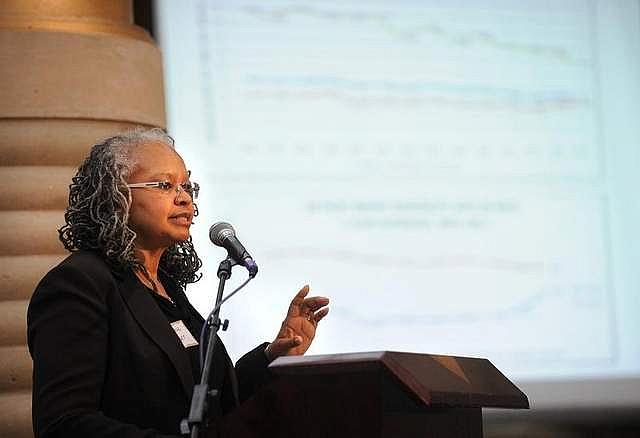Reports prompt new effort in Detroit to lower infant mortality
Nearly 500 Detroit children have died in homicides since 2000 — an average of nearly three dozen a year. Most were gun-related, and most were among children 14-18. Many youngsters just got in the way of a bullet intended for an adult, or for no one in particular.
Karen Bouffard wrote this report for The Detroit News a 2013 National Health Journalism Fellow. Other stories in the series include:
Parents' illiteracy a challenge
Mobile units take care right to kids
Detroit researchers look at causes of premature births
Program helps kids by helping moms be better parents
Infant mortality rate in Detroit rivals areas of Third World
Detroit is deadliest city for children due to prematurity, violence
Stressful childhood tied to future health risks

Alethia Carr joins other health officials to discuss lowering infant mortality rates in Detroit at the launch of a new initiative. (Bryan Mitchell / Special to The Detroit News)
A three-year project to reduce infant mortality launched Wednesday in Detroit, where more babies die before their first birthday than in any of the nation’s largest cities.
The W.K. Kellogg Foundation provided funding for creation of the Detroit Institute for Equity in Birth Outcomes. The initiative is led by CityMatCH, a national organization of urban maternal/child health leaders. Local health and community leaders will form the Detroit Institute for Equity in Birth Outcomes with guidance from CityMatCH.
The initiative kicked off with a public reception at the Charles H. Wright African American Museum in Detroit. Public health officials and other community leaders will meet today and Friday for a series of workshops and brainstorming sessions.
CityMatCH has facilitated infant mortality reduction efforts in Dayton, San Francisco, Baltimore and other large cities through the National Institute for Equity in Birth Outcomes. They have also helped public health leaders in 11 Ohio communities form the Ohio Institute for Equity in Birth Outcomes. Detroit will be the first city to have its own Institute for Equity in Birth Outcomes.
Kellogg awarded a three-year, $375,000 grant to Detroit’s Institute for Population Health (IPH) for public health initiatives, including $150,000 to implement the CityMatCH-led project. The private nonprofit institute was created a year ago to provide services to city residents. Part of the Kellogg funding will go to help IPH build its infrastructure for delivering public health services. IPH will collaborate on the CityMatCH project with Detroit’s Department of Health and Wellness Promotion and the Detroit Regional Infant Mortality Reduction Task Force.
“(Creation of) the Detroit Institute for Equity in Birth outcomes gives us an opportunity to come together and think in new ways about the persistent and unacceptable problem of a disproportionate number of our babies dying before their first birthdays,” said Leseliey Welch, community innovations manager for the Institute for Population Health.
A Detroit News study published in January found that Detroit is the most dangerous place in America to be a child. Detroit has a higher death rate for children 18 or younger than any city its size or larger in the U.S. The greatest number of deaths occur before the child’s first birthday, most due to preterm birth. Homicide is the second greatest cause of child deaths in the city.
Patrick Simpson, program officer for maternal and child health with the Kellogg Foundation, said Detroit’s infant mortality problem is “very complex.”
“While (Detroit) has a lot of programs that are focused on infant mortality, they are more neighborhood focused, rather than focusing on systemic things that need to be changed,” Simpson said.
Following the Detroit News report, Mayor Mike Duggan announced he would roll out a campaign to combat infant mortality in the city. Duggan planned to announce his effort in March, but the city was still working to finalize the details, according to John Roach, the mayor’s spokesman.
“The community problem of our high infant mortality rate is an area of intense focus right now in city government and with our local health system partners,” said Vernice Anthony, director of Detroit’s Department of Health and Wellness Promotion.
This story was originally published in The Detroit News.
Photo by The Detroit News
